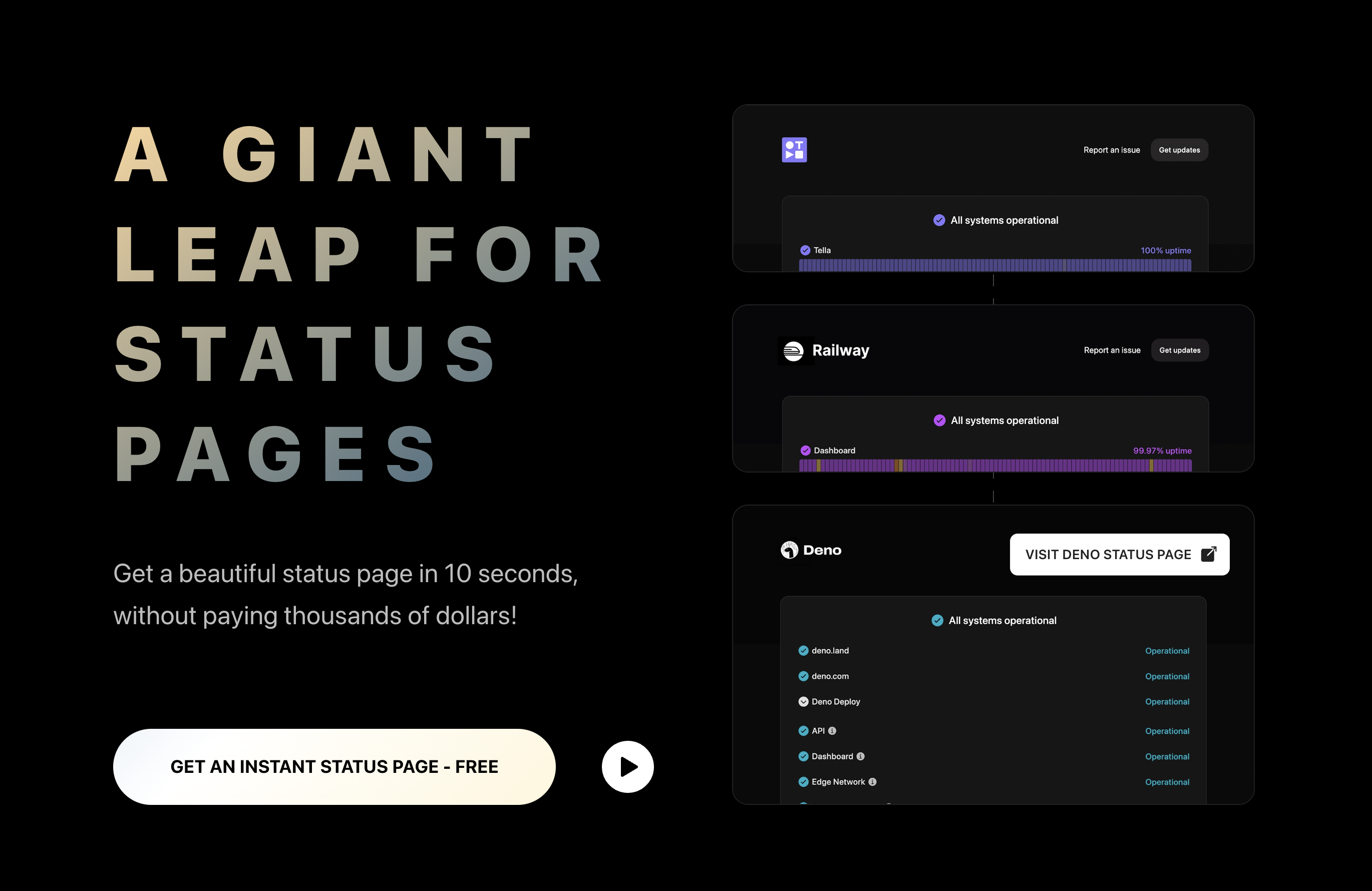DevOps Outsourcing — How to Outsource DevOps Effectively for Your Business

DevOps can be a difficult concept to comprehend, especially if you’re not an expert in the field. And, while some founders might take a shot in the dark, take a few online courses and then try to set up their own DevOps teams, this can be a costly and time-consuming venture. Thankfully, there’s other avenues that you can go down, that are simpler, and generally more cost-effective.
That’s where DevOps outsourcing comes in. With this method, you won’t need to spend hours going through applications, or learning DevOps processes yourself. Instead, you’ll get a team of trained professionals who can take care of the DevOps practices for you.
In this guide from Instatus, we’ll be looking at DevOps outsourcing, and how to outsource effectively. You’ll be in safe hands, too, as we’ve been helping DevOps teams monitor their apps and provide beautiful status pages to keep team members and customers informed on the status of products. So, let’s jump in!
What is DevOps Outsourcing?
DevOps outsourcing is where you hire external DevOps specialists to build and integrate DevOps solutions for you on a case-by-case basis. DevOps involves utilizing a set of tools and practices to streamline and automate software development life cycles.
Third-party DevOps services manage DevOps infrastructure for your business, leaving you more time to focus on other important tasks. They work with your internal software teams to create unique solutions for each of your projects.
Why is DevOps Outsourcing Important?
1. Immediate Access to top Talent at Lower Costs
Outsourcing DevOps experts is more cost-efficient since you don’t need to pay them as much as you would your own employees. DevOps engineers, in particular, are known to have high annual salaries ($104,917 on average), so hiring them as internal staff can be very costly.
There’s also a shortage of DevOps experts in the industry since it’s a fairly new occupation, so it may be hard to fill those roles in a timely fashion. That’s why many companies opt for DevOps outsourcing instead — it’s much quicker and takes less effort.
2. Focus on Core Business
If your company doesn’t specialize in DevOps operations, outsourcing experts allow you to focus on your core business tasks. They formulate a professional DevOps team from a pool of talents to save you the effort of hiring and managing the experts yourself.
3. Efficient Solutions
Outsourced DevOps experts improve your DevOps strategies in your stead, aiming to automate your operations to increase overall work efficiency. This alleviates some workload for your development teams, so they have more time to build and polish your software.
How to Outsource DevOps Effectively for Your Business
1. Carefully Evaluate DevOps Outsourcing Vendors
When deciding which DevOps outsourcing company to use, it’s important to evaluate their services, pricing, and success rate carefully. Research their case studies or examples of past work to determine the quality of their services. It’s also essential to see whether they’re efficient in their operations and communicate well with clients.
At the end of the day, they should be a good fit for your business and work well with your software development team.
Choose What Type of DevOps Service You Want
You can also choose what type of service to outsource depending on your needs. For example, you can search specifically for DevOps consultants if you want advice for solving certain issues. Or, if you want to build and improve DevOps solutions, outsource DevOps engineers.
Here’s a list of things to look out for when DevOps outsourcing:
- Background Search of the Company
- Referrals
- Reviews or Testimonials
- Case Studies (Past Work)
- Expertise and Certifications
- Accomplishments
- Pricing
- Digital Footprint
2. Define Clear Goals and Objectives for DevOps Outsourcing
Create a list of goals and objectives you want your outsourced DevOps service to achieve. This can help you choose the right experts while also giving your DevOps partner a clear idea of the work required of them.
Start by identifying areas in your DevOps that need improving. For example, you may need better tools implemented or automation for mundane tasks.
Here are some example goals and objectives you can set for your DevOps outsourcing:
Flexibility
It’s essential for your chosen DevOps service to be flexible when it comes to creating DevOps solutions. Certain scenarios require a different set of tools and techniques to optimize your operations effectively.
Scalability
If your business happens to grow during your partnership, your DevOps service should be able to adapt its services to match bigger workloads.
Optimize Costs
DevOps services can help you save money on tools. They should implement only the best tools for your business while keeping in mind your budget. Any tools that are too pricey or unnecessary should be discarded in favor of better and more cost-efficient tools.
24/7 Support
Communication is a big deal when working with third-party companies. You need to be able to reach them quickly when troubles occur, or you have concerns that need addressing.
Automation
Automating your workflows not only increases efficiency but also reduces the need for human interference. This means engineers and developers can take on more work and focus on complicated tasks that can’t be automated.
Migration
DevOps can handle your cloud migration, which consists of moving your data into the cloud or moving from one cloud to another.
Big Data
If your software stores a lot of data, DevOps should be able to streamline data flow to speed up how your software processes data.
Specific Tool Integrations
You can also request your DevOps partner to integrate specific tools, especially if they’re free, like Instatus. This monitoring tool gives you an easy way to keep track of your system operations, allowing you to spot any errors before customers notice them quickly.
3. Evaluate Risks
DevOps outsourcing can expose you to a series of risks, but these can be avoided if you consider the following things:
- Legal Problems: There may be restrictions around giving PII (Personally Identifiable Information) access to your third-party DevOps service, so make sure they have the right certifications first.
- Planning for Architecture: You and your DevOps service should always be on the same page. Discuss the vision for your DevOps architecture and make plans for how to achieve it. Also keep in mind that integrating tools like AWS will come with specific rules you need to abide by.
- Collaboration: You’ll need to share information with your DevOps partner and allow them to collaborate with your development team, so make sure you have an efficient way to accommodate all this.
4. Ensure Constant Communication
Be in constant communication with your DevOps partner to ensure a good relationship and steady cooperation. It keeps everyone on the same page and reduces the chances of miscommunication. Having regular DevOps meetings also allows you to discuss and solve certain issues as and when they happen to avoid disrupting any workflows.
Communication is key when it comes to maintaining a good level of productivity and efficiency. Create a sense of transparency across your company with regular means of communication.
No one should be left in the dark wondering what to do or who to talk to. That’s a lot of wasted time that could be spent on being productive, so make sure all relevant parties are given ways to contact your DevOps service in times of crisis.
5. Don't Make Your Decision Based Only on Your Budget
Don’t let pricing dictate your choice of outsourced DevOps. Higher rates don’t necessarily mean higher-quality services and vice versa. The most important aspects are their expertise in your toolset and how they solve your problems. Some companies may even offer discounts, so keep an eye out.
6. Formalize the Outsourcing
After choosing a DevOps vendor to partner with, you need to sign a contract with them to make it official. There are two types of contracts you can use: a closed scope and an open scope.
Closed Scope
A closed-scope contract is where you define everything:
- What the workload consists of
- The deadlines
- The cost
This type of contract is closed to changes, which means you can’t alter any of the conditions during the project. However, it will give you full control over what services you get and how much you pay, so you never have to worry about exceeding your budget.
Open Scope
An open-scope contract involves a lot more flexibility but is more ambiguous when it comes to cost and deadlines. You simply present a problem while the solution is determined by the DevOps service. There is no pre-set workload so that changes can be made anytime during the project by either party.
For pricing, you can pay them by the hour, so you're only charged for the time they put into your project. Since DevOps solutions require some trial and error, it’s best to use an open-scope contract to allow for changes to occur.
7. Try Them out
Finally, it’s time to finalize the contract so your DevOps service can start working on upgrading your infrastructure, researching new automation tools, and resolving existing pain points for you.
Conclusion
Creating your own internal DevOps team can be quite costly and inefficient, so it’s worth investing in third-party DevOps services instead. DevOps outsourcing means trusting your data with outside parties, so it’s essential to research them carefully first. They should also be experts in your existing tools, like Instatus, so they know how to manage them best.
Here at Instatus, we provide you with an efficient way to monitor your system operations, allowing you to share issues with customers before they can even ask about them.
Start for free today to get your status page up and running in just 10 seconds.
Get ready for downtime
Monitor your services
Fix incidents with your team
Share your status with customers


